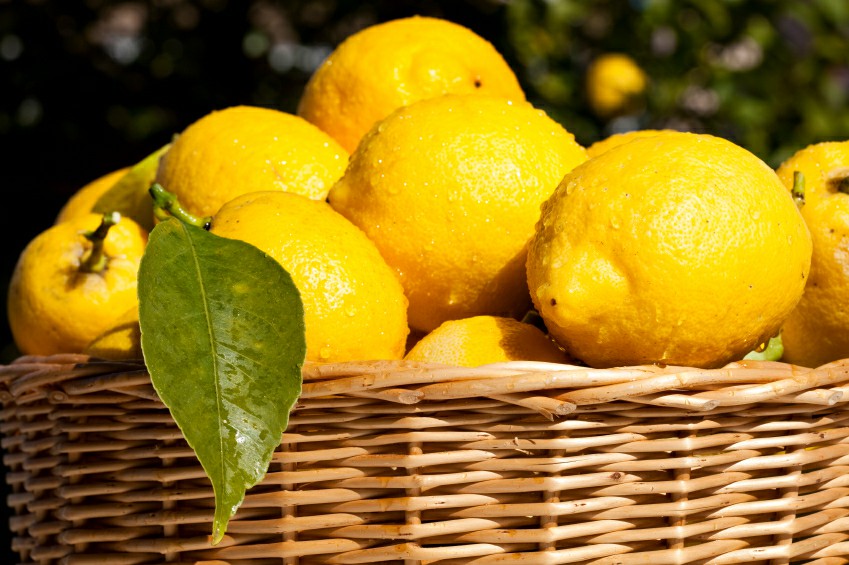27 Proven Health Benefits of Lemon

Benefits of Lemon for health that you need know. Moreover, the Lemon contains properties beneficial for prevent and fight various diseases. Lemon is undoubtedly one of the most widely used citrus fruits in the world. Lemon tree is a small evergreen tree native to Asia. Lemons belong to the Rutaceae family, which also includes oranges, limes, tangerines and grapefruit. This fruit is oval to round in shape with a pronounced bulge at one end.
Its appearance is similar to lime except that it has a thick and leathery skin. It contains a very high level of vitamin C. Though, the inner flesh is extremely sour to be eaten, it is often used to add flavor to other ingredients and dishes due to its refreshing smell and tart flavor.
Nutrition Facts Of Lemon: The health benefits of lemon are due to its many nourishing elements like vitamin C, vitamin B6, vitamin A, vitamin E, folate, niacin, thiamin, riboflavin, pantothenic acid, copper, calcium, iron, magnesium, potassium, zinc, phosphorus, and protein. It is a fruit that contains flavonoids, which are composites that contain antioxidant and cancer-fighting properties. It helps prevent diabetes, constipation, high blood pressure, fever, indigestion, as well as improve the skin, hair, and teeth. Studies conducted at the American Urological Association highlight the fact that lemonade or lemon juice can eliminate the occurrence of kidney stones by forming urinary citrate, which prevents the formation of crystals.
People use it to make lemonade by mixing lemon juice and water. Many people also use it as a washing agent, because of its ability to remove stains. The scent of lemons can also repel mosquitoes, while drinking lemon juice with olive oil helps get rid of gallstones. It is well known for its medicinal power and is used in many different ways. As per the results reported in a study by the Annals of the Rheumatic Diseases, lemon provides protection against inflammatory polyarthritis and arthritis too.
It’s a good source of vitamin C: Citrus fruits like lemons are high in vitamin C, which is a primary antioxidant that helps protect cells from damaging free radicals.
Vitamin C may reduce your risk of cardiovascular disease and stroke, and lower blood pressure. Research published in Stroke showed that people with low vitamin C levels, especially obese men with high blood pressure, have a higher risk of stroke. Vitamin C may also help prevent or limit the duration of the common cold in some people, although studies are conflicting.
While lemons don’t top the list of citrus fruits high in vitamin C, they’re still a good source. According to the United States Department of Agriculture, 1/4 cup raw lemon juice provides about 23.6 grams of vitamin C. That’s over 30 percent of the recommended daily allowance (RDA).
Hair Loss: Lemon when mixed with coconut oil is beneficial in treating hair loss. You can make a paste by combining equal quantities of crushed lemon seeds and black pepper; or lemon and vinegar. Apply it on your scalp for 10 minutes and then rinse off. This will prevent hair loss. Massaging your scalp with a mixture of egg and lemon juice can also strengthen your hair roots.
Corns: Corns are lumps formed due to hardening of the skin at certain places like the soles of the feet and the palms of your hands. Lemon juice can easily dissolve these lumps on the skin.
Dandruff: Lemon is a great natural remedy for dandruff. Application of lemon juice on the scalp can help fight dandruff and also prevent its recurrence.
Acne and Blackheads: The anti-bacterial properties of lemon make it effective for curing acne and blackheads. You can dilute some lemon juice extract in water and apply it on the affected area with a cotton swab. Leave it for 15 minutes and wash off with cold water. This will help in healing the acne as well as reducing the frequency and severity of blackheads. Apart from this, having a glass of lemon water with honey will cleanse your system, thus preventing acne and breakouts.
Balances pH Levels: Lemons are one of the most alkalizing foods for the body. Sure, they are acidic on their own, but inside our bodies they’re alkaline (the citric acid does not create acidity in the body once metabolized). Lemons contain both citric and ascorbic acid, weak acids easily metabolized from the body allowing the mineral content of lemons to help alkalize the blood. Disease states only occur when the body pH is acidic. Drinking lemon water regularly can help to remove overall acidity in the body, including uric acid in the joints, which is one of the primary causes of pain and inflammation.
Boosts Your Immune System: Lemons are high in vitamin C, which is great for fighting colds. They’re high in potassium, which stimulates brain and nerve function. Potassium also helps control blood pressure. Ascorbic acid (vitamin C) found in lemons demonstrates anti-inflammatory effects, and is used as complementary support for asthma and other respiratory symptoms plus it enhances iron absorption in the body; iron plays an important role in immune function. Lemons also contain saponins, which show antimicrobial properties that may help keep cold and flu at bay. Lemons also reduce the amount of phlegm produced by the body.
Energizes You and Enhances Your Mood: The energy a human receives from food comes from the atoms and molecules in your food. A reaction occurs when the positive charged ions from food enter the digestive tract and interact with the negative charged enzymes. Lemon is one of the few foods that contain more negative charged ions, providing your body with more energy when it enters the digestive tract. The scent of lemon also has mood enhancing and energizing properties. The smell of lemon juice can brighten your mood and help clear your mind. Lemon can also help reduce anxiety and depression.
Indigestion: Lemons are loaded with vitamin C and are quite effective in curing digestion problems. They contain digestive juices, which facilitate digestion, thus relieving heartburn, bloating, belching and gastric problems. A glass of lemon juice is often recommended in case of fever and stomach upset. Lemon, when taken with warm water early in the morning, aids in proper digestion. It also removes toxins from the kidney and the digestive system, thus improving immunity and purifying the blood.
Aids digestion: Lemon juice not only encourages healthy digestion by loosening toxins in your digestive tract, it helps to relieve symptoms of indigestion such as heartburn, burping, and bloating.
Promotes Healing: Ascorbic acid (vitamin C), found in abundance in lemons, promotes wound healing, and is an essential nutrient in the maintenance of healthy bones, connective tissue, and cartilage. As noted previously, vitamin C also displays anti-inflammatory properties. Combined, vitamin C is an essential nutrient in the maintenance of good health and recovery from stress and injury.
Excellent source of potassium: As already mentioned, lemons are high in potassium, which is good for heart health, as well as brain and nerve function.
Reduces inflammation: If you drink lemon water on a regular basis, it will decrease the acidity in your body, which is where disease states occur. It removes uric acid in your joints, which is one of the main causes of inflammation.
Bumps up the vitamin C quotient: Since your body doesn’t make vitamin C on its own, it’s important to get enough of it from the foods and drinks you ingest. Luckily, lemons are chock-full of the vitamin.
Lowering stroke risk: According to the American Heart Association (AHA), citrus fruits may help lower the risk of ischemic stroke in women. A study of data from nearly 70,000 women over 14 years showed that those who ate the most citrus fruits had a 19 percent lower risk of ischemic stroke than women who consumed the least.
Citrus fruits are a good source of flavonoids, which are thought to help protect against cancer and cardiovascular disease. Ischemic stroke is the most common type of stroke. It is caused by a blood clot blocking the flow of blood to the brain.
Maintaining a healthy complexion: Vitamin C plays a vital role in the formation of collagen, the support system of the skin. When eaten in its natural form or applied topically, vitamin C can help fight skin damage caused by the sun and pollution, reduce wrinkles, and improve overall skin texture, according to findings of a study on mice, published in 2014.
Cancer prevention: Lemons and lemon juice are an excellent source of the antioxidant vitamin C. Antioxidants may help prevent the formation of free radicals that are known to cause cancer, although the exact role played by antioxidants in cancer prevention remains unclear.
It freshens breath: Have you ever rubbed a lemon on your hands to remove a powerful stench? It’s thought to neutralize odors. The same folk remedy may apply to bad breath caused by eating foods with strong smells like garlic, onions, or fish.
Keep your breath sweeter by drinking a glass of lemon water after meals and first thing in the morning. Lemon is thought to stimulate saliva, and water helps prevent a dry mouth, which leads to bad breath caused by excess bacteria growth.
Split Ends: Applying a mixture of lemon juice and olive oil on the hair can help in treating split ends.
Cleans your bowels: Lemons increase peristalsis in the bowels, helping to create a bowel movement thus eliminating waste and helping with regularity. Add the juice of one lemon to warm water and drink first thing in the morning.
Dental Care: It is also frequently used in dental care. If the fresh lemon juice is applied on the area of a toothache, it can assist in getting rid of the pain. Massaging the juice on the gums can stop gum bleeding while also eliminating the bad odors that can come from various gum diseases and other conditions.
Lemons have powerful antibacterial properties; experiments have found the juice of lemons destroy the bacteria of malaria, cholera, diphtheria, typhoid and other deadly diseases.
Increasing iron absorption: Iron deficiency is one of the most common nutrient deficiencies in developed countries and a leading cause of anemia. Pairing foods that are high in vitamin C with foods that are iron-rich maximizes the body’s ability to absorb iron. Spinach and chickpeas, for example, are good sources of iron. Squeezing a little lemon juice atop a salad with these ingredients can help maximize the intake of iron as well as vitamin C.
Soothes Respiratory Disorders: Lemon juice assists in relieving respiratory problems and breathing problems, such as its ability to soothe a person suffering from an asthma attack. Being a rich source of vitamin C, it helps in dealing with more long-term respiratory disorders as well.
Treats Cholera: Diseases like cholera and malaria can be treated with lemon juice because it acts as a blood purifier.
